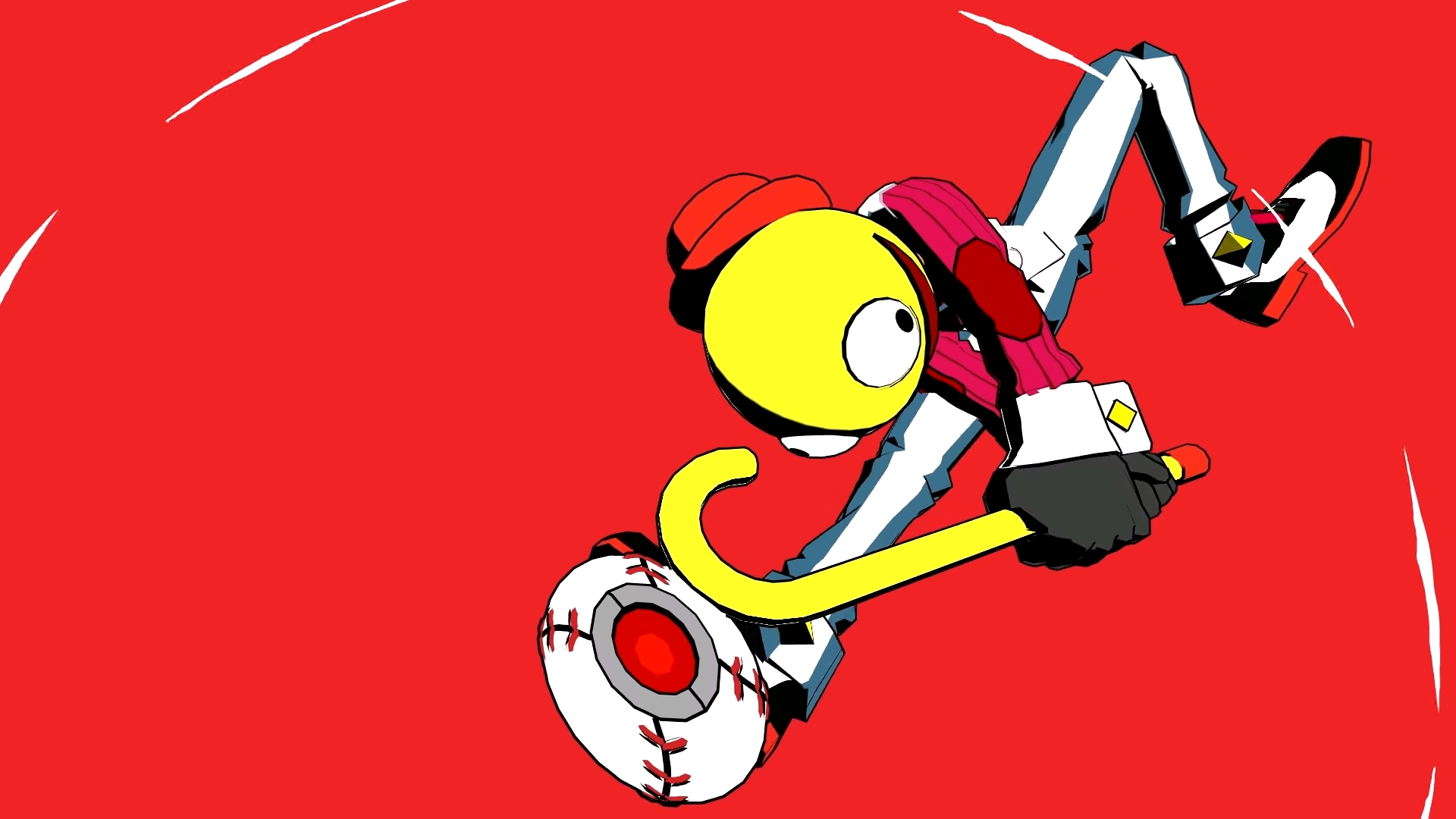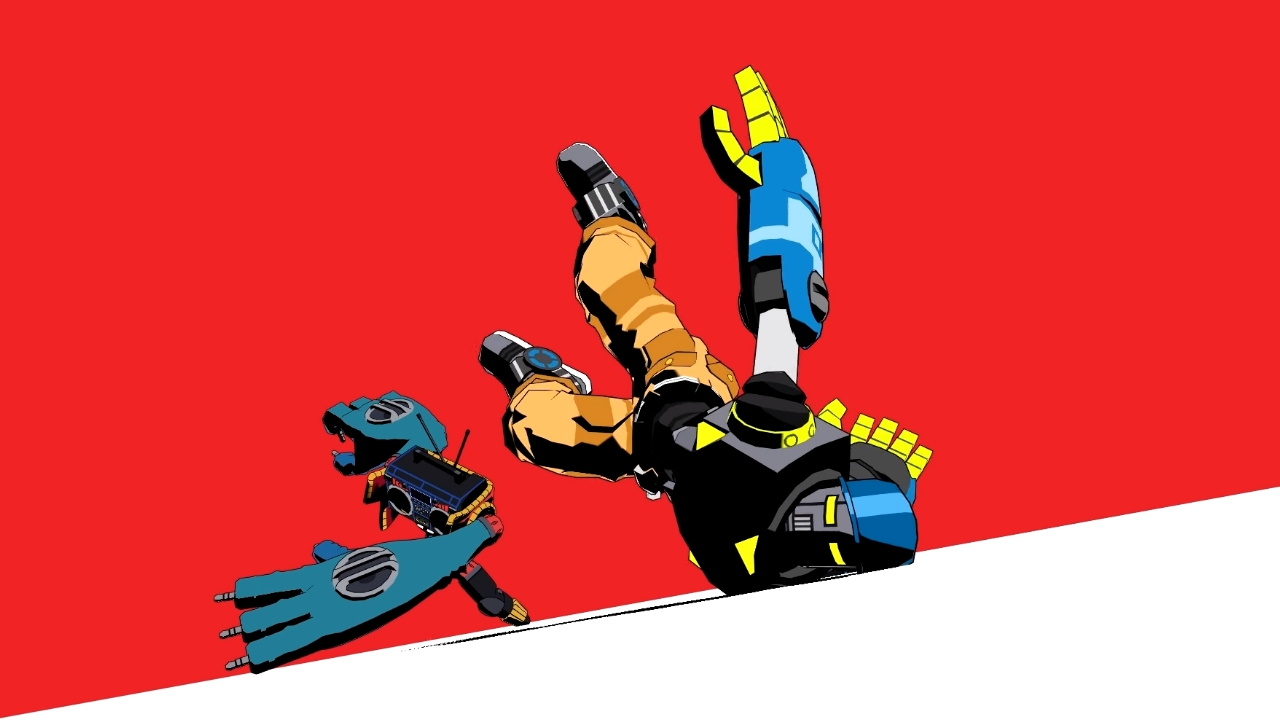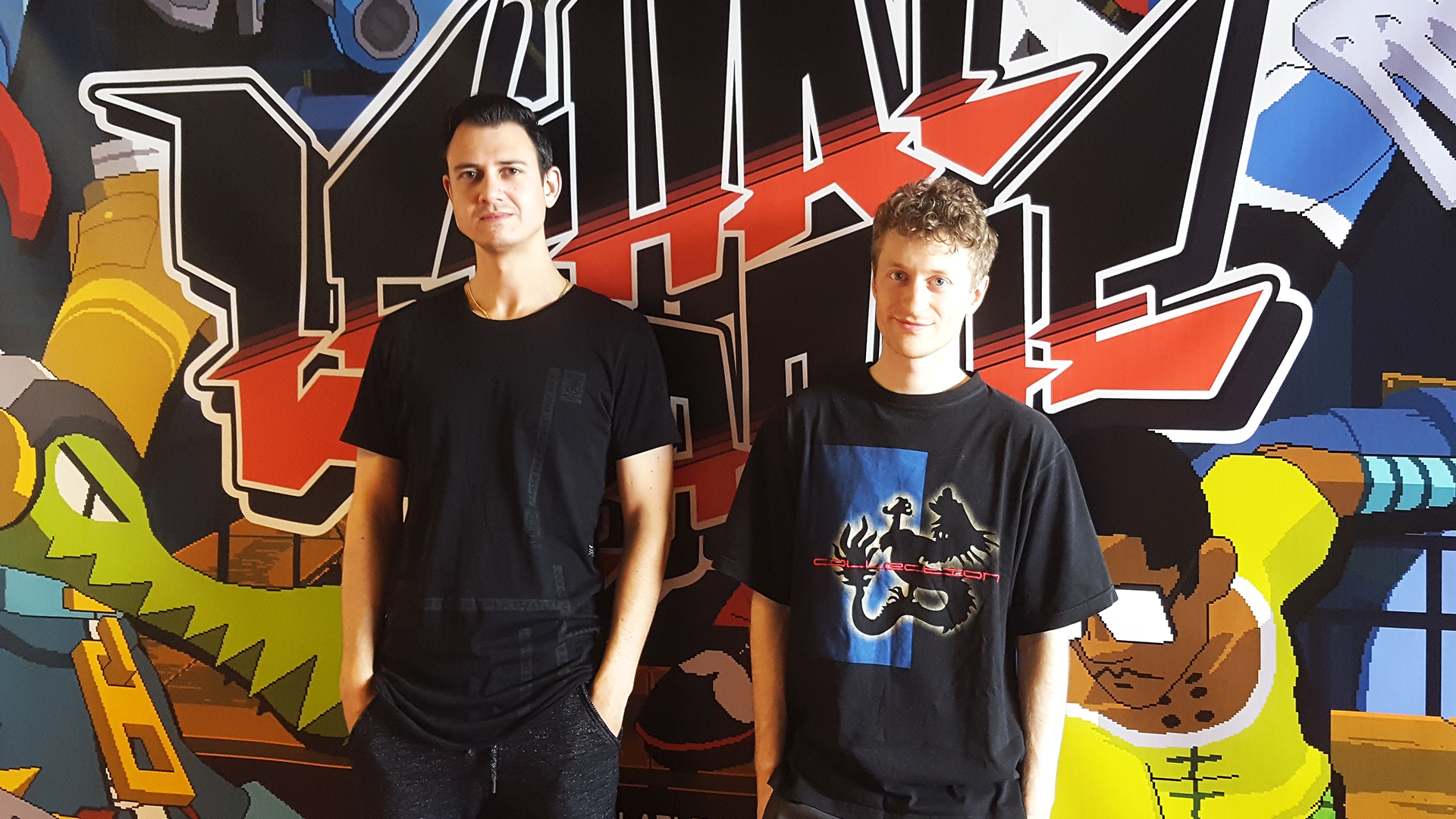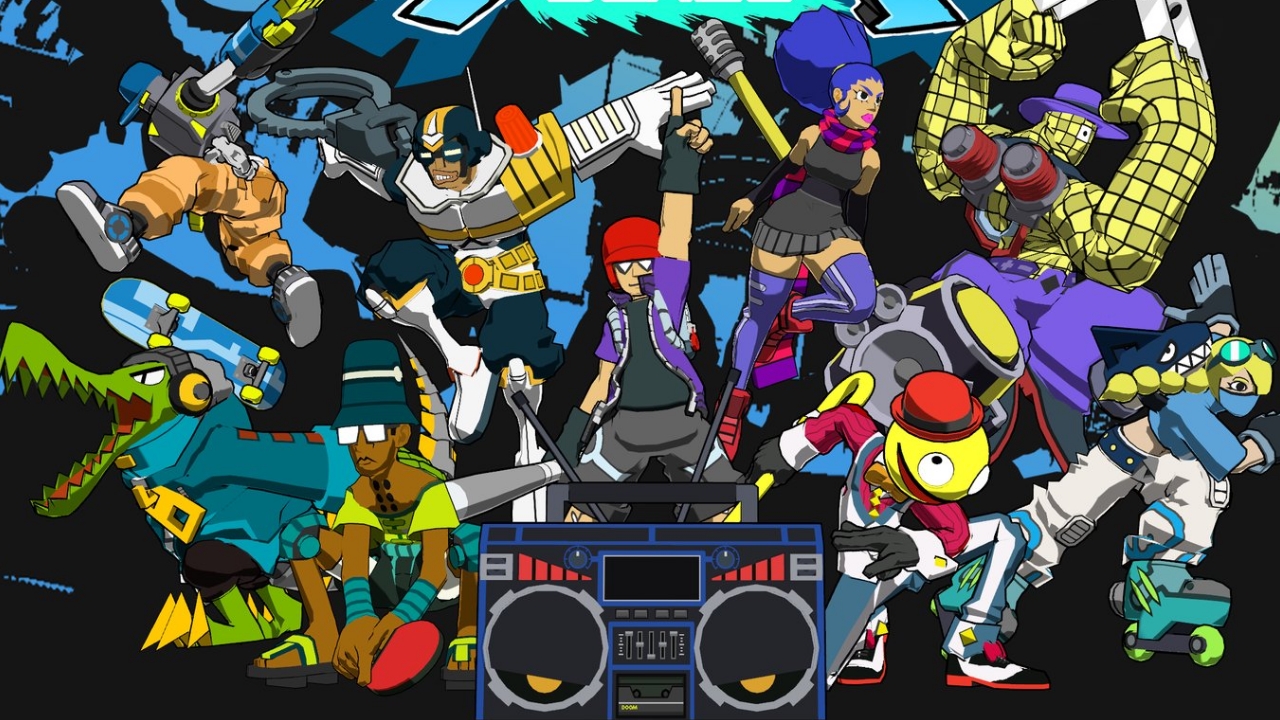How Lethal League Blaze became the future's best ball game
Ain't nothing like this funky game inventing its own competitive genre

Few noises are more satisfying than the resounding BINK! of an aluminum bat hitting a baseball with pinpoint precision. It's something you'll hear very, very often in Lethal League Blaze, backed by a soundtrack full of funky fresh beats and quite probably the roar of your own excited yelling. This 2.5D brawler is the greatest underground sport in gaming, steeped in the same street culture that informed the look, sound, and feel of the beloved Jet Set Radio series.
Like Super Smash Bros. or Nidhogg, Lethal League Blaze turns an unconventional fighting style into an infinitely replayable series of duels, as two to four players smack around a modified baseball at ever-increasing speeds until only one person stands triumphant over their K.O.ed-by-a-fastball foes. Lethal League has been well-loved for years, from the total revamp of Blaze, to the 2014 original, and even in its beginnings as a Flash prototype. And it never would've happened if two soft-spoken students from the Netherlands hadn't got to talking after school.
Dion Koster and Tim Remmers are Team Reptile, named for the cool, cold-blooded nature of the creature rather than any Mortal Kombat reference. The two were situated in adjacent offices at a game development school; Remmers was finishing up his master's degree, while Koster had just graduated and needed some help working on a game prototype. "Tim was doing all kinds of fancy visual stuff, so I asked him to do the more visual side of the game," Koster recalls. "Then we just rolled into a company. I guess it was never a real clear set-off point, like 'We're going to do this for years and years.' Maybe that's the better way to start a company. You're just like, 'We're here together and we can make stuff, let's help each other out and then we go.'"
That first game eventually took form as Megabyte Punch, a Smash Bros.-inspired 2.5D brawler featuring colorful robots who can customize themselves with a selection of weaponized body parts. Megabyte Punch was one of the earliest games to successfully make the grade in the now-defunct Steam Greenlight program, building up a small but loyal following of players who enjoyed its PvE and PvP stylings. "One of the things we added [about a year-and-a-half into development] was a giant missile that you could launch, and you could also shield yourself from it," explains Koster. "But as in Smash Bros., if you timed the shield correctly, you could reflect the giant missile. Turns out that, in the versus mode, we just started doing only that. We were just reflecting [the insta-kill] missile back and forth until somebody died. It was exciting and a lot of fun - and then we just thought, 'This should be a minigame.'" The first seeds of Lethal League's boisterous, back-and-forth combat had taken root.
What started as the concept for a quick minigame eventually grew into something all its own, with Koster toiling away at a prototype for two all-in weeks while Remmers continued work on updates for Megabyte Punch. "I think it's important that if you have an idea, someone could go really deep into it without going back and forth," muses Koster. "And if it sucks, it sucks - but at least you don't get anything watered down, right? You have just one person making the decisions really quick. I think that helped." Just as the Flash platformer Meat Boy begat the indie legend Super Meat Boy, the Lethal League Flash prototype (still readily available online) was a humble, simple beginning that clearly showed signs of greatness from the very start.
So many of Lethal League Blaze's best qualities are already present in the one-button prototype. Stylish batters walloping a bouncing ball that gets exponentially faster with each thwack; an intriguing, almost otherworldly backdrop; music featuring exotic samples and a hard-hitting beat; a boombox in the HUD that tracks the ball's ludicrous speed; thundering sonic booms as the ball breaks through the sound barrier and all the colors invert into a visually stunning eclipse. Through sheer word of mouth, Lethal League wormed its way through the 'net - but its big break came when it was selected for the grand finals of the 2013 Mystery Game brackets at Ultimate Fighting Game Tournament 9 (a discontinued annual event that's since been reborn as Combo Breaker).

Lethal League Blaze expands your strategic options with a throw, giving you a way to counter parries that might otherwise spell your doom. You also have a health bar now, to give newcomers a fighting chance. But Koster tried out plenty of other ideas that didn't make the cut, like a goal that only opens up when you've knocked out your opponent. "Instead of HP, we had bolt affinity," says Koster. "So, you would hit the ball and then charge it with your power, and then once it was filled up, only then you could kill with it." There was also some experimental air dashing that didn't pan out. "I tried a lot of times to make this work and I couldn't," Koster laughs. "It didn't feel like it had a place - you had no reason to do it."
"I have no clue what this is," says a commentator; ten seconds of gameplay later, he concludes "This is the hypest game I've ever seen." Lethal League was a smash hit with the crowd, as the uninitiated players quickly grasped the controls and delved into high-level mind games in record time. "To see the reaction to that first prototype was enough for us to turn this into a full game," says Remmers. "The first time they saw the eclipse effect in the tournament, the crowd started to scream. It was actually the first time that I saw a lot of people checking out one of our games and being so excited. It's a special feeling." Funnily enough, Koster didn't even see Lethal League shining in the spotlight until the next day - he had already gone to sleep during the stream, assuming that he must've missed the game at some point because there was just no way it would be selected as the big finale.
Sign up to the GamesRadar+ Newsletter
Weekly digests, tales from the communities you love, and more
Contrary to what you might think, Team Reptile didn't discover the somewhat similar arcade game Windjammers until after they had made Lethal League, nor had they seen the raucous reflect-a-thons of the community-invented Rose Ball in Street Fighter 4 (the closest precursor Remmers can think of is the Tekken Ball mode tucked away in Tekken 3). Dion and Remmers had simply arrived at the same magical spark that gave those games their fun, crowd-pleasing appeal: a tennis-like showdown that's easily understood but difficult to master. It's the simplicity and accessibility of Pong, but with an irresistible coat of eye-catching style and mechanical substance.

The full version of Lethal League hit Steam in 2014, expanding on everything that made the prototype so great. That meant a bigger selection of banging beats, more supremely cool stages, smooth online play, additional modes, and a complete roster of quirky characters joining the original batter Raptor. Two fighters really stood out for fans: Candyman, a literally smiley-faced dandy who yelps in a cartoony voice and smacks the ball around with his cane, and Latch, a bipedal, cybernetically enhanced crocodile who uses his metallic tail as a bat. (For anyone curious, Team Reptile would have to go with Candyman as the dream Smash Bros. inclusion, while Latch makes the most sense for a Rivals of Aether crossover.) Lethal League was an instant cult classic - not just for its gameplay, but for the sense of street style channeling the same youthful creativity as the revered Jet Set Radio games.
"That's Dion - I'm not street at all," laughs Remmers. Long before he decided to make games for a living, Koster got heavily into inline skating, then discovered a passion for breakdancing. "There was a class in my hometown, and this guy, my teacher, had been dancing since the '80s," Koster remembers. "And he didn't only teach the dance, he'd teach the whole history and culture. Sometimes, we would have a dance class where we wouldn't dance at all. It's just him telling us about how this came to be and what it is you're doing." Lethal League's style isn't about aping Smilebit's graffiti-filled, idiosyncratic skating creation; it came from a place of genuine upbringing in - and respect for - street culture. But Team Reptile didn't mind tapping into the undying adoration Jet Set fans have for the franchise: Lethal League Blaze introduces a new character named Jet who's wearing a very familiar set of skates, and they managed to commission an absurdly catchy new track from Jet Set's one-of-a-kind composer Hideki Naganuma.

I'm a sucker for smartly designed palettes in fighting games, and Team Reptile has mastered the art of wonderfully diverse costume colors (with pitch-perfect names for each outfit). "Palette swaps are things that are kinda iconic, I guess," says Koster. "Some of the more fun ones really flip around the character." Unlike Skullgirls, the various palette swaps aren't meant to reference particular pieces of pop culture - but the community has taken that upon themselves, with plenty of fan-made costume mods for every character. Koster and Remmers have taken notice, and they like what they see.
Lethal League Blaze is definitely the sports' final form. It's gone all-in on 3D character models (whereas the original Lethal League used 2D sprites traced from 3D renders), partially influenced by the impeccable 'I can't believe it's not hand-drawn anime' graphics of Guilty Gear Xrd. The roster brings everyone back and introduces even more lively misfits, with additional characters still to come. And the full-blown story campaign adds a lovely layer of lore to the proceedings; just as DJ Professor K stoked the anti-authoritarian spirit of youth gangs in Tokyo-to, an enigmatic figure known as The Queen narrates your struggles to push back against the oppressive control of Shine City's Safety League. Blaze is already enjoying 'Overwhelmingly Positive' reviews on Steam, with a 97% approval rating from users, and console versions for PS4, Xbox One, and (the oft-requested) Nintendo Switch are slated for spring 2019.
If you haven't experienced Lethal League Blaze yet, you need to - and if you've already tried it, you should go back and play some more. I'd liken it to a communal game of Super Smash Bros. Ultimate: when you're spectating, all you want to do is play, and when you're playing, all you want to do is stay on for another round. It has the kind of welcoming, easy-to-grasp gameplay that makes for enjoyable casual matches, while hardcore players can endeavor to master its many nuanced systems and extremely varied roster, vying for ranked online or local dominance. It's inspiring to see high-level Lethal League Blaze matches full of maneuvers and techniques that I never would've imagined, but now instantly wish to learn.
Unlike, say, Street Fighter 5, Lethal League Blaze isn't meant to be a 'forever' game with years' worth of DLC in the pipes, though Team Reptile plans to support the community with balance tweaks and additional content for some time to come. "I think to keep everything fresh, you also need to work on new things, or it will just turn into a chore of supporting the old things," says Remmers. And while their next game probably won't revolve around bashing a high-speed ball back and forth, you can bet that Team Reptile will continue to specialize in super stylish, deeply satisfying, endlessly entertaining multiplayer. "I think we naturally try to make things that make competitive sense," says Koster.
For more behind-the-scenes looks at how beloved games get made, here's the story of CarnEvil, an arcade frightfest once called "the most twisted video game ever created."
Lucas Sullivan is the former US Managing Editor of GamesRadar+. Lucas spent seven years working for GR, starting as an Associate Editor in 2012 before climbing the ranks. He left us in 2019 to pursue a career path on the other side of the fence, joining 2K Games as a Global Content Manager. Lucas doesn't get to write about games like Borderlands and Mafia anymore, but he does get to help make and market them.



